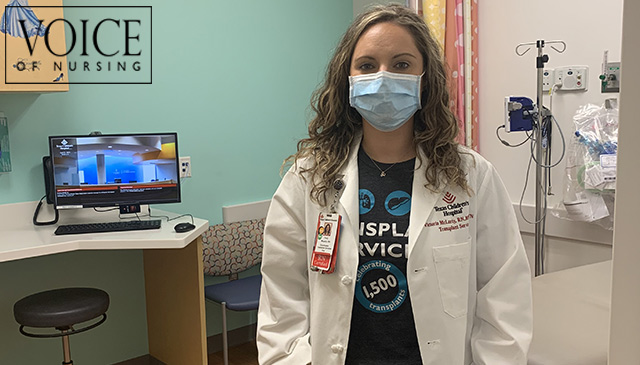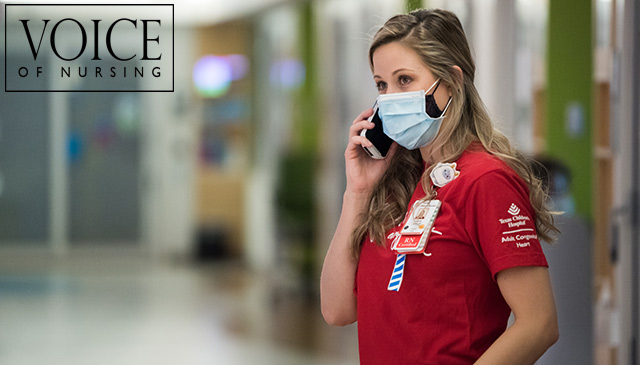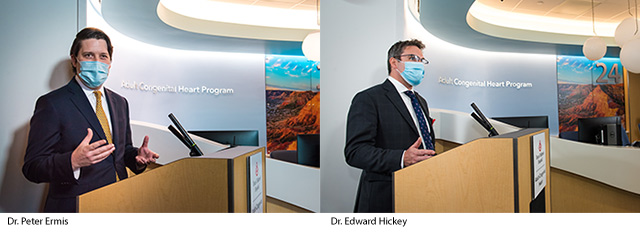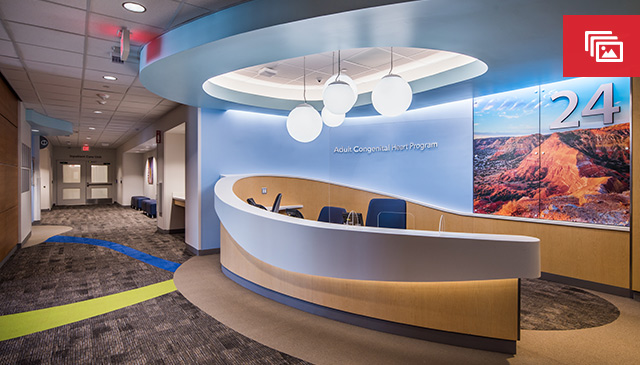
Victoria McLarty shares what she enjoys most about her role as a transplant coordinator for Texas Children’s Heart Center and why it’s important to register to become an organ donor. Read more

Victoria McLarty shares what she enjoys most about her role as a transplant coordinator for Texas Children’s Heart Center and why it’s important to register to become an organ donor. Read more

Whitney Gore shares how her team prepared for the opening of the Adult Congenital Heart Inpatient Care Unit and how this new unit will benefit our patients and families. Read more

On November 4, Texas Children’s Heart Center® leaders, alongside President & CEO Mark A. Wallace, gathered for an intimate ribbon cutting ceremony to commemorate the opening of the hospital’s first-of-its-kind facility for adults with congenital heart disease.
The 27,000-square-foot space, situated on the 24th floor of Texas Children’s Lester and Sue Smith Legacy Tower, includes a 16-bed inpatient unit, outpatient clinic, cardiac rehab gym, diagnostics lab and more.
“This is the #1 Heart Center in the world and it just got even better,” Wallace said. “Only at Texas Children’s is this possible, especially during this time and this era.”
That same day, the outpatient clinic saw its first patients in the new, state-of-the-art space.
“Texas Children’s has always been innovative in the treatment of congenital heart disease with Drs. Denton Cooley, Dan McNamara, Edward Singleton and others paving the way for this population that’s increased over time,” Dr. Peter Ermis, medical director of the Adult Congenital Heart (ACH) Program, said. “We’re picking up their mantle and carrying on their legacy, and I think it’s appropriate that we’re doing so in the Lester and Sue Smith Legacy Tower. We’re seeing some of those exact same patients they cared for as kids.”
The new facility is a game changer for this patient population. About 1.6 million adults currently live with congenital heart disease in the United States, but they are a rare patient within an adult hospital environment. Treatment for these patients within an adult hospital does not allow them to get the unique care they need. In a children’s hospital, the majority of cardiac patients have congenital heart disease, and these adults with congenital heart disease are not as unique.
“Until now, patients have been managed somewhat ad hoc – either in pediatric environments or in adult environments with teams that are not particularly experienced in managing congenital heart defects,” Dr. Ed Hickey, surgical director of the ACH Program, said. “That’s all changing here at Texas Children’s. This vision that we’ve realized has come from the top down. Mr. Wallace himself realized that it’s our responsibility to care for these patients irrespective of age, complexity or location.”
The two leaders are excited for the future as Texas Children’s combines the incredible facility, dedicated team and resources to provide the best possible care to adults with congenital heart disease.
The inpatient unit on the 24th floor will open in January 2021. To learn more, visit texaschildrens.org/ACH.

Since 2004, the Adult Congenital Heart (ACH) Program at Texas Children’s has provided groundbreaking care, and next week, the hospital will open a first-of-its-kind dedicated facility designed by and for adults with congenital heart disease. The 27,000-square-foot space, situated on the 24th floor of Texas Children’s Lester and Sue Smith Legacy Tower, will include a 16-bed inpatient unit, outpatient clinic, cardiac rehab gym, diagnostics lab and more.
“This innovative approach to care is unprecedented, and another step forward for our no. 1 ranked hospital for cardiology and heart surgery by U.S. News & World Report,” Dr. Cameron Dezfulian, director of the ACH ICU, said. “While we have been caring for adult patients for many years, this dedicated, state-of-the-art space is tailored to them and their families. It will bring together adult practitioners with the expert pediatric congenital heart care of Texas Children’s. Everything we do in this space will be done with the goal of reducing the impact of these conditions on adults living with congenital heart disease.”
Today, there are more adults than children living with congenital heart disease in the United States. Significant advancements in cardiac care, and improvements in survival after undergoing heart surgery as a baby or young child have resulted in this growing population. While it may seem counterintuitive for adults to be cared for at a children’s hospital, data suggests that if you are an adult living with congenital heart disease and are in need of surgery or cardiology follow up, the outcomes are likely to be better if you are operated on by a congenital heart surgeon and cared for by a cardiologist at a children’s hospital.
“It’s important to recognize that adults living with congenital heart disease have unique issues that are not typical to adults with acquired heart disease,” said Dr. Peter Ermis, medical director of the ACH Program, said. “Because of these unique issues, some adults with congenital heart disease do not get the care they need in an adult setting. It’s only after they develop symptoms that they recognize there is an issue, and at that point, it may be too late. Our goal is to keep these patients in our care so we are able to anticipate the issue before they arise.”
Texas Children’s ACH Program is accredited by the Adult Congenital Heart Association (ACHA) and is one of only three accredited programs in Texas. As pediatric patients with congenital heart defects transition into adulthood, members of the team – with the help of our Cardiology Transition Medicine Team – advise patients on health and lifestyle choices for their adult needs, including physical challenges, exercise options and family planning. The ACH Program offers comprehensive medical and surgical care in collaboration with colleagues at Texas Children’s Pavilion for Women and Texas Children’s Fetal Center.
The new outpatient clinic will open November 4. The inpatient unit will open in January. Before the floor opens, a lot of preparation and training took place. On October 8 and 9, multidisciplinary teams successfully completed a series of simulated patient care scenarios on the state-of-the-art floor to test the workflow processes and address any concerns.
The program’s leadership team is comprised of Ermis, Dezfulian, Dr. Ed Hickey, surgical director; Dr. Prakash Masand, director of ACH imaging; and Barbara Vazquez, director of ACH nursing. The program also is home to the largest number of ACH accredited cardiologists in the state, 25 dedicated ACH inpatient nurses, five ACH ICU advanced practitioners, techs, assistants and sonographers.
“We currently care for about 2,200 adult patients, but that number is growing exponentially,” Hickey said. “Due to advancements in medical care, surgical care and technological innovations, about 95 percent of children born with congenital heart disease survive and many reach adulthood. With this new space, we can better provide continuity of care from birth through adulthood.”

Texas Children’s Heart Center has once again been named the best place in the country for pediatric cardiology and heart surgery in the U.S. News and World Report 2020-2021 Best Children’s Hospitals rankings – the center’s fourth straight year at No. 1.
“We are incredibly proud to be named the best place in the country for children who are in need of pediatric cardiology and heart surgery,” said Chief of Pediatric Cardiology Dr. Daniel Penny. “Achieving this honor for the fourth consecutive year is a testament to our dedicated multidisciplinary team who works tirelessly to advance the field and provide the best care possible to our patients and their families. We don’t take this responsibility lightly, and these survey results only inspire us to work harder to be even better for our patients and each other every day.”
The U.S. News rankings use a well-accepted framework for evaluating quality of health care, which factors in patient outcomes, such as mortality and infection rates; available clinical resources, such as specialized clinics and programs and external accreditations; and compliance with best practices. Improved rankings demonstrate a health care organization’s commitment to not only providing high-quality care, but also to identifying gaps where improvements are needed.
This past year, the Heart Center built on the successes of previously existing programs and continued to excel in their outcomes metrics. One of those metrics was related to the center’s heart transplant survival ratio, which earned a top score for its one-year heart transplant survival ratio. The Heart Center continues as one of the busiest programs utilizing ventricular assist devices to support hearts that might need transplantation.
“Leading the field in transplantation and ventricular assist devices is important to ensure that we can provide expert care for the sickest patients,” said Dr. Christopher Caldarone, chief of Congenital Heart Surgery. “We are proud of our teams that keep us at the forefront of medical care. This comes about by maintain a culture focused on continuous improvement. We constantly measure our performance and drive for better outcomes. Quite simply, we never rest.”
Other notable initiatives include:
Public reporting of Heart Center outcomes
The Society of Thoracic Surgeons (STS) is a national leader in health care transparency and accountability and publishes outcomes from congenital heart surgery programs across the country. The members of the Heart Center strongly believe that transparent reporting of outcomes after congenital heart surgery is important to insure that patients and families are well-informed with accurate information to help make informed health care decisions. The STS database publishes risk-adjusted outcomes on its public website and the Heart Center at Texas Children’s Hospital has adjusted operative mortality rates that are among the best reported.
International collaboration to monitor outcomes in the catheterization laboratory
In partnership with clinical and physician leadership, the Heart Center’s Cardiac Catheterization Labs implemented processes to submit metrics on all catheterization procedures included in the American College of Cardiology’s IMPACT Registry®. This national register collects quality-focused data on the management and outcomes of pediatric and adult congenital heart disease (ACHD) patients who undergo diagnostic and interventional cardiac catheterization procedures. The registry also allows Heart Center leadership to compare performance against a national aggregate for quality improvement initiatives.
Expertise to provide care for every patient
The Heart Center provides excellent care for patients with all types of congenital heart disease. From simple to complex problems, the Heart Center has expertise in every field. We have specialists that can provide interventions for babies before they are born and throughout infancy, childhood, and all of adulthood. The Heart Center can provide expert care for all aspects of congenital heart disease.
Continued dedication to Adult Congenital Heart Disease Program
Texas Children’s ACHD Program allows patients with congenital heart disease to receive seamless continuity of care from birth throughout adulthood. As pediatric patients with congenital heart defects transition into adulthood, the program’s multidisciplinary team of experienced congenital heart disease specialists advises them on health and lifestyle choices for their adult needs, including physical challenges, exercise options and family planning. The program offers comprehensive medical and surgical care in collaboration with colleagues at Texas Children’s Pavilion for Women® and Texas Children’s Fetal Center®. The hospital’s ACHD Program is accredited by the Adult Congenital Heart Association (ACHA) and is one of only three accredited programs in Texas.
Learn more about the Heart Center, its services, and volume and outcomes.
On June 12, Juliana Graves met her donor heart family with her mom, dad and brother by her side. Juliana, now 6, had a life-saving heart transplant at Texas Children’s in 2014 at just 17 days old.
The Graves family knew they would one day want to meet the family who gave their daughter the gift of life. That meeting happened last week when the Graves family met the Aguiars at LifeGift where they shared stories and memories about Juliana and the Aguiars’ son, Christopher.
Christopher’s mom, Jennifer Aguiar, also listened to her son’s heart beating inside Juliana’s chest.
“Meeting the Graves family was both beautiful and comforting,” Jennifer Aguiar said. “It’s helping me process the loss of my son.”
Riki Graves, Juliana’s mother, said her family thinks and prays about Christopher every day and that being able to meet his family was “wonderful.”
During the meeting, Juliana handed Jennifer a teddy bear and gave her a big, long hug.
“The most important thing this family has given me is Christopher’s heart,” the little girl said.
Living without a new heart was not an option for Juliana. Doctors with Texas Children’s Fetal and Heart Centers diagnosed her with a complex heart condition before she was born and initially thought she would need several heart surgeries shortly after being delivered.
Riki was already fighting a battle when she found out, at 20-weeks pregnant, that her unborn daughter might not survive. Earlier in her pregnancy, Riki was diagnosed with breast cancer and decided to pause treatment while still pregnant.
Her team of doctors at the Fetal Center monitored her pregnancy very closely. Juliana was born on April 9, 2014 and it was determined that her heart was too structurally abnormal and weak to undergo surgery. Juliana was placed on the transplant list on April 21. On April 26, at 17 days old, she received her new heart.
Dr. Jeffrey Heinle, associate chief of congenital heart surgery, led the transplant surgery, which was a success. He and Dr. Jeff Dreyer, pediatric cardiologist and medical director of heart failure, cardiomyopathy and cardiac transplantation, have been following Juliana and working with the Graves family to provide them with continuous, ongoing care.
“The Graves’ story is a remarkable one and much of it is owed to the generosity of the Aguiar family,” Heinle said. “Organ donation truly saves lives. This is a perfect example of that.”
Dreyer agreed and said it’s always nice to be part of such a happy ending.
“This mother and child have overcome so many obstacles,” he said. “Continuous monitoring for Juliana will be needed, but she is on a positive path forward thanks to her donor family and others.”
Diana Harter, assistant clinical director of nursing for transplant, was Juliana’s transplant coordinator. She said she knows the Graves family has been waiting a long time to meet their donor family and that such meetings are meaningful and healing for everyone involved.
“Donor meetings are so special to witness,” said Harter, who attended the meeting with the Graves and Aguiars last week via video conference. “They bring everything full circle.”